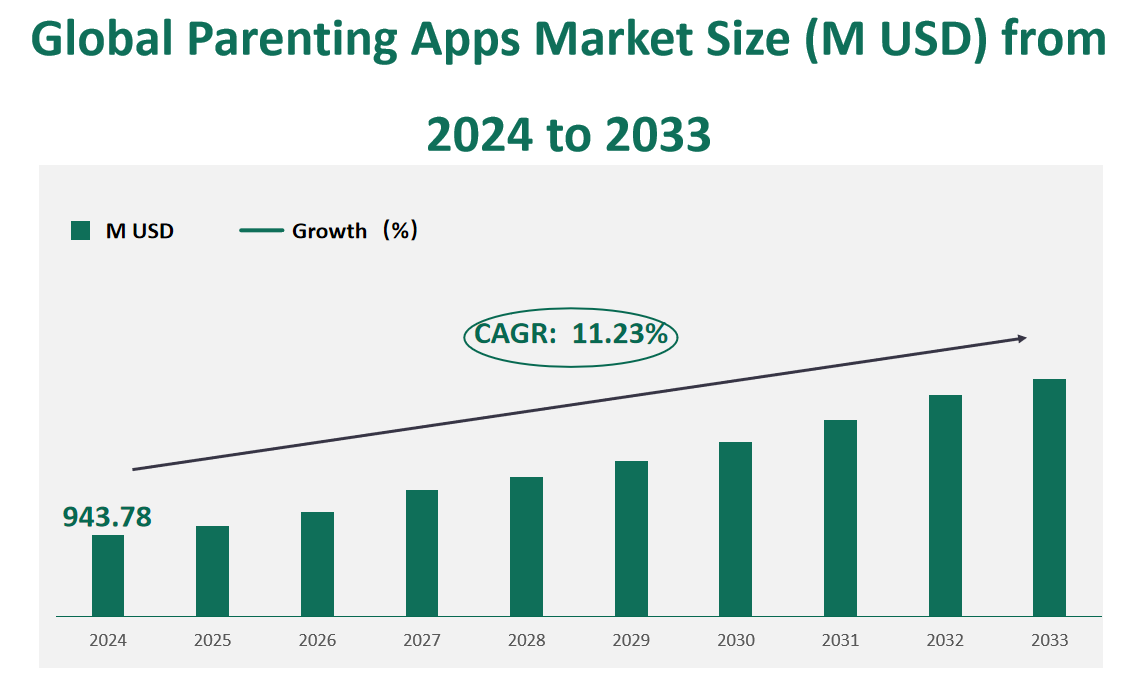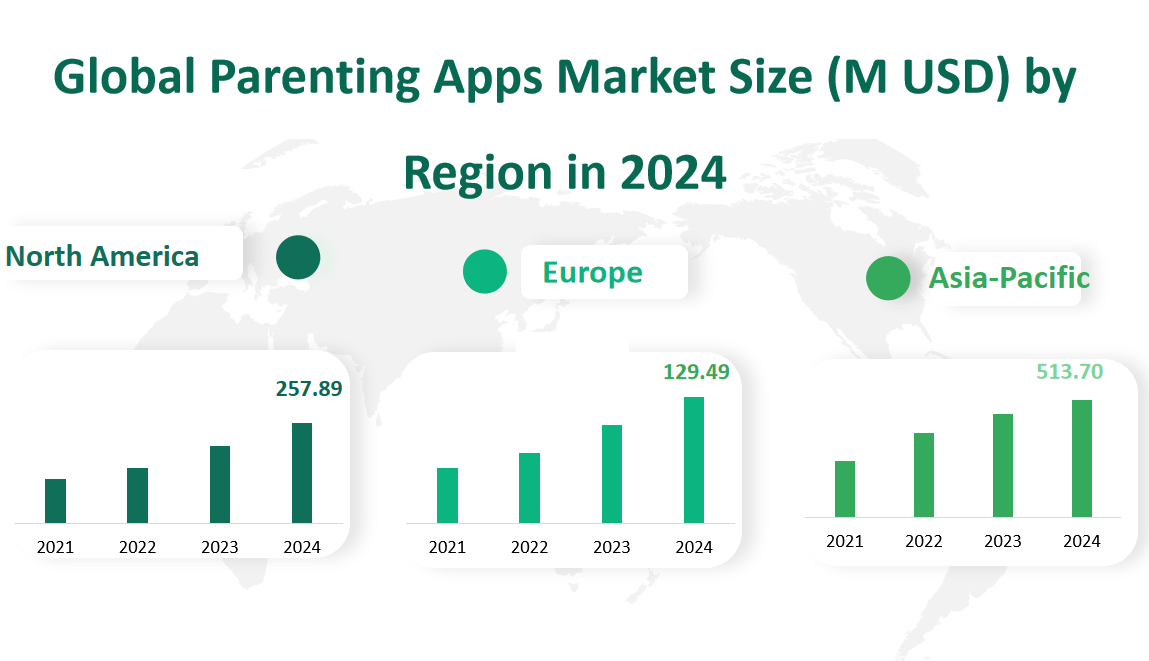1 Global Parenting Apps Market Insight Analysis
The global parenting apps market is valued at USD 943.78 million in 2024, with a CAGR of 11.23% from 2024 to 2033.
A series of accidents may occur in the process of parenting, which is not an easy thing. Parents need to face new situations and challenges constantly. Parenting Apps provides some useful tips and guidance. The app features calendar, scheduling, messaging, appointment, and finance tools to help co-parents better communicate and manage their shared lives.
Figure Global Parenting Apps Market Size (M USD) and CAGR (2024-2033)

2 Parenting Apps Market Growth Drivers and Restraints
Technological Advancements: The continuous evolution of mobile technology and the increasing penetration of smartphones have been pivotal in driving the adoption of parenting apps. Features such as artificial intelligence, machine learning, and advanced data analytics enable more personalized and effective parenting solutions.
Changing Parenting Norms: There is a shift towards more tech-savvy and informed parenting practices, particularly among millennials and Gen Z. These demographics are more inclined to seek digital solutions for their parenting needs, thus expanding the market’s consumer base.
Rising Awareness on Child Development: Parents are increasingly aware of the importance of early childhood development and are seeking tools to support their children’s growth. Parenting apps offer educational content, milestone tracking, and expert advice, aligning with this heightened consciousness.
Government and Corporate Initiatives: Some governments and organizations are promoting digital parenting solutions by integrating them into public health services or offering incentives for their use. Such initiatives boost the market’s growth by increasing accessibility and affordability.
Network Effects: As more parents use parenting apps, the value of these platforms increases due to network effects. Shared experiences, recommendations, and community support make these apps more attractive, encouraging further adoption.
Privacy and Security Concerns: With the sensitive nature of the data handled by parenting apps, privacy and security are significant concerns that can hinder market growth. Parents may be reluctant to share personal information without robust data protection assurances.
Digital Divide: Despite the growing digital landscape, there are regions and demographics with limited access to smartphones or the internet, restricting the market’s reach and potential.
Content Overload and Quality: The abundance of parenting apps can lead to content overload for users, making it challenging to identify high-quality, reliable resources. This can lead to a preference for traditional parenting methods among some users.
Monetization Challenges: Many parenting apps are freemium, relying on advertising or in-app purchases for revenue. Balancing a sustainable monetization model with user experience can be challenging, potentially limiting the market’s expansion.
Regulatory Environment: The regulatory environment surrounding health and wellness apps can be complex, with varying standards across regions. Navigating these regulations adds operational complexity and cost, potentially constraining market growth.
3 Technological Innovations in the Parenting Apps Market
Artificial Intelligence (AI): AI is increasingly integrated into parenting apps to offer personalized content and insights based on user behavior and preferences. AI-driven features can range from predictive analytics for baby’s needs to automated responses to common parenting queries.
Internet of Things (IoT): Smart devices and wearables are being incorporated into parenting apps to monitor and analyze baby’s health and development metrics, providing real-time data and alerts to parents.
Augmented Reality (AR) and Virtual Reality (VR): These technologies are being explored to create immersive educational and developmental content for children, enhancing engagement and learning outcomes.
Blockchain: While still nascent in this sector, blockchain technology could potentially be used to ensure secure data sharing and transactions within parenting platforms, building trust among users.
4 Global Parenting Apps Market Size by Type
Pregnancy Tracker Apps are designed to support expectant mothers through their pregnancy journey, offering features like due date calculators, health tips, and progress tracking. In 2024, the market value for Pregnancy Tracker Apps is projected to be $314.89 million. This type of app holds a market share of 33.37%, indicating a substantial but slightly declining trend from previous years. Despite the decrease, Pregnancy Tracker Apps remain a critical component of the parenting apps market, reflecting the continuous demand for tools that assist in prenatal care and preparation.
Baby Tracker Apps are tools that help parents monitor and manage their baby’s daily activities such as feeding, sleeping, and diaper changes. According to the forecast, these apps will generate a market value of $427.50 million in 2024, capturing a market share of 45.30%. This represents a significant increase from previous years and indicates a growing reliance on digital solutions for infant care. The robust growth of Baby Tracker Apps underscores the shift towards more comprehensive and convenient parenting tools that facilitate active tracking and management of a baby’s development and well-being.
Co-parenting Apps facilitate communication and coordination between co-parents, often in separated or divorced families. These apps aim to streamline co-parenting challenges by providing shared calendars, message boards, and expense tracking. In 2024, Co-parenting Apps are expected to have a market value of $201.38 million, with a market share of 21.34%. Although this type holds the smallest market share among the three, its growth from previous years suggests an increasing awareness and utilization of such tools to improve co-parenting dynamics.
Table Global Parenting Apps Market Size and Share by Type in 2024
Type | Market Size (M USD) 2024 | Market Share 2024 |
|---|---|---|
Pregnancy Tracker Apps | 314.89 | 33.37% |
Baby Tracker Apps | 427.50 | 45.30% |
Co-parenting Apps | 201.38 | 21.34% |
5 Global Parenting Apps Market Size by Application
The parenting apps market is segmented into two primary applications: Android Systems and iOS Systems. In 2024, the Android Systems are expected to generate a market value of $686.09 million, accounting for a dominant market share of 72.70%. This substantial lead indicates the widespread adoption of Android devices among parenting app users, reflecting the platform’s versatility and broad user base.
Conversely, iOS Systems are projected to reach a market value of $257.69 million in 2024, capturing a market share of 27.30%. Despite being the second-largest segment, iOS Systems maintain a significant portion of the market, highlighting the loyalty and purchasing power of Apple’s user base. The consistent market share of iOS suggests a stable user base that prefers the integrated ecosystem of Apple products.
Table Global Parenting Apps Market Size and Share by Application in 2024
Application | Market Size (M USD) 2024 | Market Share 2024 |
|---|---|---|
Android Systems | 686.09 | 72.70% |
IOS Systems | 257.69 | 27.30% |
6 Global Parenting Apps Market Size by Region
The global parenting apps market is also characterized by diverse regional dynamics. In 2024, North America is projected to lead with a market value of $257.89 million, holding a market share of 27.33%. This region’s dominance can be attributed to high internet penetration, advanced digital infrastructure, and a tech-savvy consumer base that embraces digital parenting solutions.
Europe follows with a market value of $129.49 million and a share of 13.72%. The growth in Europe reflects a growing acceptance of digital parenting tools, supported by a young, tech-friendly population and increasing awareness of the benefits of digital parenting aids.
The Asia-Pacific region is expected to show significant potential with a market value of $513.70 million and a substantial share of 54.43%. This region’s growth is driven by a large population base, rising disposable incomes, and a rapid increase in smartphone users, making it a critical market for parenting apps.
South America and the Middle East & Africa, while smaller in comparison, are emerging markets with values of $21.43 million and $21.27 million respectively, and shares of 2.27% and 2.25%. These regions, though nascent, present opportunities for growth as digital adoption increases and local app developers cater to specific cultural and parenting needs.
North America’s mature market is characterized by high competition and a saturated app environment, yet it continues to grow due to continuous innovation and the integration of new technologies like AI in parenting apps. Europe’s market is steadily growing, with a focus on privacy and data security, aligning with the region’s stringent regulations. The Asia-Pacific region, led by countries like China and India, is experiencing rapid growth fueled by a young demographic and increasing internet access. South America and the Middle East & Africa are at the nascent stage but offer high potential for growth as digital literacy improves and local app markets mature.
Figure Global Parenting Apps Market Size (M USD) by Region in 2024

7 Global Parenting Apps Market Analysis by Major Players
Babytree
Company Profile: Established in 2006 and headquartered in China, Babytree is a leading platform for parenting services. The company has expanded its presence mainly across Asia, catering to millions of parents seeking guidance and community support throughout their parenting journey.
Business Overview: Babytree operates as a comprehensive parenting website and app, providing a plethora of services from parenting knowledge to interactive community engagement. The platform focuses on creating a supportive environment for parents by offering resources, activities, and interactive services designed to assist in every aspect of child-rearing.
Product Offered: Babytree’s offerings include a range of products such as professional pregnancy knowledge, multi-pregnancy gadgets, mother communication platforms, and a marketplace for high-quality goods tailored for mothers and babies. Their services are designed to support parents from pregnancy preparation through to early childhood education, ensuring a holistic approach to parenting.
Qinbaobao
Company Profile: Founded in 2013 and based in China, Qinbaobao specializes in creating an engaging platform for parents to document and share their baby’s growth journey. The app has gained popularity for its user-friendly interface and comprehensive features that appeal to modern parents.
Business Overview: Qinbaobao offers an app that allows parents to record and share their baby’s development from pregnancy to early childhood. The platform supports various media formats like photos, videos, and audio recordings, making it a versatile tool for capturing precious moments.
Product Offered: The core product is the Qinbaobao app, which provides private growth recording, intelligent parenting assistance, and a treasure trove of parenting knowledge. Additionally, the app includes a marketplace for high-quality baby products, enhancing the overall user experience by integrating shopping with community features.
Baby Connect
Company Profile: Founded in 2009 and headquartered in the US, Baby Connect has established itself as a pioneer in the baby tracking application sector. The company’s global reach extends across various countries, offering its services to a wide array of users.
Business Overview: Baby Connect is renowned for its comprehensive baby tracking application available on the App Store. It provides features like graphical reports, trending charts, weekly averages, medication, vaccine tracking, growth tracking, timers, notifications, emails, and .csv export. The app also facilitates real-time information exchange with the child’s other parent, babysitter, nanny, or daycare.
Product Offered: Baby Connect’s primary product is its tracking app, which allows users to monitor daily information about their children, including feeding, diapers, sleep, mood, activities, medicines, and photos. The app supports multiple authorized users for each child, enabling seamless communication and coordination among parents, family members, and childcare staff.

